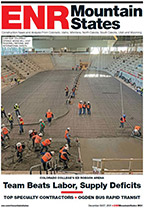...says Alex Guerrero, executive vice president with Sun Valley-based Tower General Contractors.
Tower traditionally sends its clients a bill, asking to be paid every 30 days, Guerrero says. But clients are asking to pay in 45 days, he says. Factor in subcontractors who want to be paid every 15 days and it puts Tower in an unusual position, Guerrero says.
“It’s something we never thought we would have to do – play bank,” he says.
Contractors have been dealing with these challenges ever since the economy went south in the last quarter of 2008.
“We saw an almost instantaneous private (construction) slowdown,” says Dan Rogers, executive vice president and chief operating officer with Santa Clara-based Blach Construction. “It was fairly abrupt and dramatic.”
The executives say that they want to rely on stable markets or long-term projects to ride out the recession.
Tower General Contractors is working on projects that will keep the company occupied through 2009 and into 2010.
“We want to find work that lasts longer than one year to weather the economy,” Guerrero says.
But other companies have found that some traditional markets they have relied upon are suffering.
While Blach Construction can rely on its core education and health care markets, tenant improvements is a struggling sector, Rogers says.
Companies might normally spend to improve a facility or move into a new building, Rogers says, but the economy is causing those corporations to hold off on those moves and tenant improvements.
Bley with Dome Construction agrees and says he had had to lay off some staff on the tenant improvement side.
“Tenant improvement is still weak,” he says.
Help may come through the state and federal governments through stimulus and California fixing its budget problems, the executives say.
Because of the state budget deficit, hundreds of projects were placed on hold, Rogers says.
Now that lawmakers have come up with a budget plan, they need to release those delayed projects as well as projects that need bond sales to proceed, he says.
“Lawmakers need to do what they can to release funds for projects,” Rogers says.
The stimulus funding provided by the federal government may give contractors a boost in a down year, but speed is needed, says McLamb.
While the current administration has shown it will move with speed in providing stimulus, other parties need to move just as fast, McLamb says.
“That same expedition needs to work through the state, counties and agencies,” he says.
Tower’s Guerrero says he believes that the stimulus should motivate legislators to take more chances to fund projects.
Everyone from accountants to truckers and even, unfortunately, lawyers can benefit from construction, he says.
“Somebody’s got to do something,” Guerrero says. “Someone needs to stick their neck out. Now is the time for people to step up.”


Post a comment to this article
Report Abusive Comment